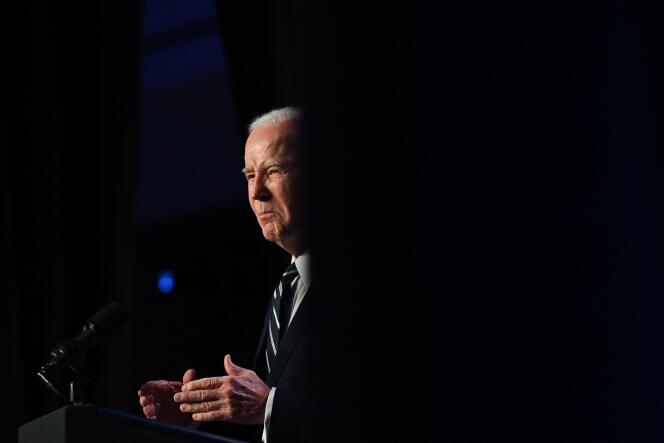


Distancing itself without letting go of Israel's hand. This is the impossible task that faces the Biden administration. Confronted with its blatant diplomatic isolation, the US is trying to qualify – without calling into question – its support for Israel, while the war in Gaza following the Hamas attack on October 7 has killed some 29,000 Palestinians, most of them civilians. For the third time since the start of the war, Washington on Tuesday, February 20, vetoed a draft resolution at the UN Security Council, calling for an immediate humanitarian ceasefire. The text, put forward by Algeria, was supported by 13 out of 15 countries. The UK abstained.
"We just weren't able to support a resolution today that was going to put sensitive negotiations in peril," explained National Security Council spokesperson John Kirby on Tuesday. He was referring to ongoing diplomatic exchanges to secure a temporary ceasefire for several weeks in Gaza, in exchange for the release of hostages held by Hamas. Brett McGurk, Joe Biden's Middle East adviser, will return to Cairo on Wednesday for talks with Egypt's powerful intelligence chief, Abbas Kamel, one of his key contacts. On Tuesday, Ismail Haniyeh, head of the Hamas political bureau, was in the Egyptian capital.
McGurk will also be in Israel on Wednesday as the country considers a military offensive in the Rafah region, south of the Palestinian enclave, to complete its ground operation. After a telephone conversation last week between Biden and Benjamin Netanyahu, the White House renewed its opposition to such an offensive on Tuesday. It would be "a disaster," said the spokesperson, in the absence of a "credible plan" for the 1.4 million or so Palestinian refugees squeezed into the south of the strip in absolute distress.
In an unexpected move, the Biden administration circulated in New York a draft resolution competing with Algeria's, which was immediately published in the press. The text also calls for a temporary ceasefire in Gaza, but depending on the release of all hostages and a lifting of restrictions on the delivery of humanitarian aid.
The White House does not want to appear isolated or locked in its support for Israel. The US text represents "a yellow card" to Israel, reminding it "of the limits that must not be exceeded," according to a highly-placed Israeli source. The draft rejects a "major ground offensive in Rafah," as well as any action leading to "the reduction of Gaza's territory, on a temporary or permanent basis, including through the official or unofficial establishment of so-called buffer zones." Zones that Israeli bulldozers and tanks have already begun to map out along the strip.
You have 57.51% of this article left to read. The rest is for subscribers only.
